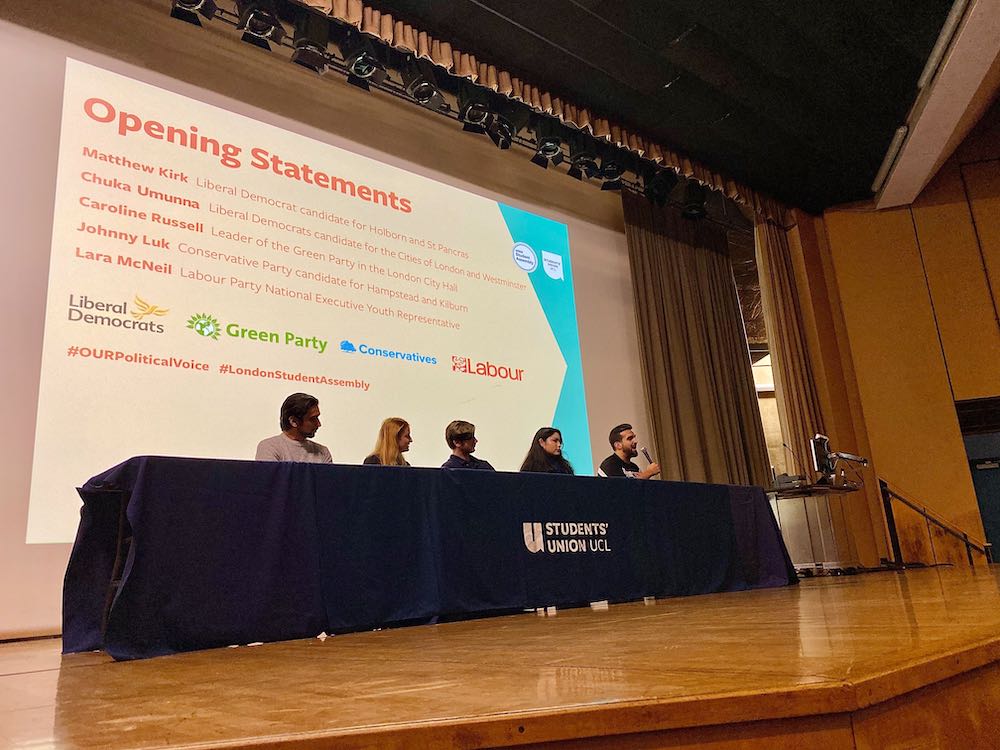Written by Toby Payne, third-year BA History
On Friday evening societies, campaign groups, political representatives and students from filled into the large Logan Hall at UCL for the London Student Assembly, organised by the Student’s Union.
Two issues, of course, were on everyone’s lips, the December election and then more broadly, Brexit. I started by speaking to several single-issue pressure groups, and student political societies, all enthusiastically sharing their opinions.
Cathleen, from For Future’s Sake, a student-led movement campaigning for a People's Vote on Brexit told me that she believed this election to be “a once in a generation-defining one”, a sentiment shared by multiple speakers throughout the evening including Chuka Ummuna, the Liberal Democrat Parliamentary candidate for the Cities of London and Westminster, in his pitch to students. Cathleen’s desire to see politics diversified beyond the ‘pale, male and stale’ norm, was also something touched on by later panels.
Youth engagement and activism was a clear theme, and one the Union had been keen to promote, holding a ‘Goats For Votes’ campaign the previous day, encouraging students to register to vote likely attracted further with the promise of seeing furry friends on campus.
Only the Liberal Democrats and Labour Party opted to send student representatives but were both enthusiastically sharing their respective message ahead of the election. All four students on the Liberal Democrat stand drew me to the pragmatism and importance of the policies their party was putting forward, comparing theirs to the ‘unrealistic’ promises of Labour. Mental health, drug policy and the NHS were 3 key areas they wanted to stress, with their position of being ‘major nationwide party unequivocally for remain’ an attractive policy for students. That week all of them had been campaigning around UCL for Matthew Kirk, their PPC for Holborn and St Pancras, an important seat with an especially high number of students living in.
Aisha and Isaac from UCL Labour had a large poster of the manifesto promise to scrap tuition fees and talked further on several of their party’s policies they thought would be attractive to students. It was the “most ambitious” manifesto of all the parties, and the “only one that takes seriously the pressing issues facing students,'' they told me. They have both been campaigning across London in several marginal seats the party needs to win, including Uxbridge and South Ruislip, the seat of Boris Johnson, with Ali Milani, their PPC, keen to debate the PM who has pulled out of hustings events there. Aisha was confident over Keir Starmer’s seat in St Pancras and lauded him for crafting Labour’s ‘brilliant Brexit policy’.
Molly Hartill, UCL’s Community Relations Officer, opened the main event stressing how important it is for students to register to vote and get energised, the main reason behind the event held. By not voting she said, we are “essentially giving away our voice.”
First on the programme for the evening was a hustings style event, with candidates from all of England’s major parties sending representatives standing across North and Central London. All bar Johnny Luk, the Conservative Party PPC for Hampstead and Kilburn, spoke almost exclusively on Brexit and the generational importance of the general election in changing the shape and future of the country. Mr Luk chose instead to focus on the forces underlying his political philosophy and the necessity for the government to further seek to unleash the forces of ‘enterprise and entrepreneurship’.
The youngest of those speaking was Lara McNeill, the Youth Representative on Labour’s NEC and King's College student, who spoke passionately about her experience with the NHS at university and how it was one example, of many, where “society (was) ripping off those who worked hard”. Her major point was that the societal divide today was between “those who live off work and those who live off wealth”, and that the election was an attempt to “answer the question; whose side are you on?”
Following the hustings, a panel was convened on the issue of Youth Engagement. All the speakers were in some way involved with students and young people. Richard Brooks, from FFS, spoke extensively on the need for as many young people to vote as possible, with FFS focussing on 20 key seats where there are slim majorities, where students could tip the seat. Young people make up the difference nationwide, and while record numbers are registering to vote, more still can.

I spoke to a girl sat on my row, who was conflicted over where she should vote, her London student flat or back at her family house in Oxford, but was keen to chat through with her coursemates the necessity to tactical vote, something many students seemed acutely aware of.
Mete Coban, a Labour Councillor and Chief Executive at My Life My Say, used his experience in youth engagement to explain where he thought the disconnect was and why, between young people and politics. Using an alarming statistic that the average age of a councillor is 66 and an MP was mid-50s to illustrate his point, he encouraged efforts like Automatic Voter Registration, a Labour policy, and increasing education in schools to bridge this divide.
It was clear that those attending were energised and raring to go ahead of the December election, which way it would go however, no one could say for sure.